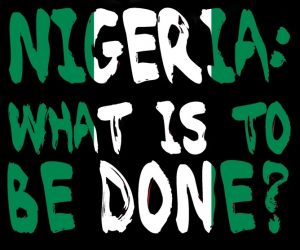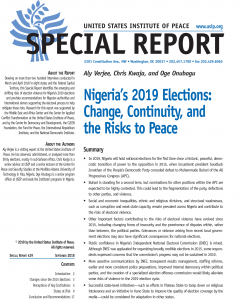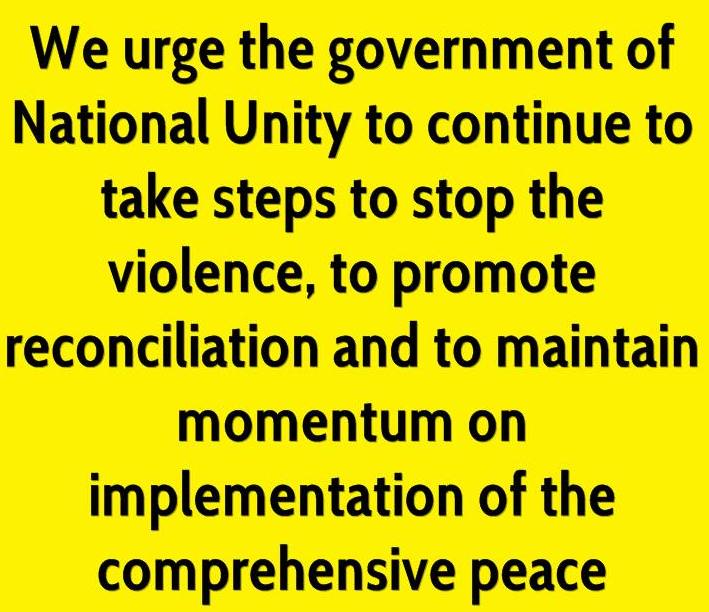
Does a Government of National Unity answer this question unproblematically?
Vice-President Yemi Osinbajo is obviously on an assignment: to test the political waters by beating the drums of a Government of National Unity, (GNU), at this point in time. He was quite forthcoming about being on an assignment when he spoke on this matter a few days ago by disclosing he has the authority of the president to hint the nation that a GNU is in the making. Perhaps frightened by what the late Dr Chuba Okadigbo would call a state of dynamic inactivity, (a lot of activities are taking place but the country is not moving in any hopeful direction), something of that nature from on high had to be said. But the instinctive reaction in some quarters to the water testing or whatever it is was, oh, what a perfect recipe coming at a very awkward time. That is, ‘awkward time’ in the sense that the government is coming round to an idea that would have been a perfect game changer if adopted by, say, December 2016 unlike now when it is like the government is compelled to look for a fallback after walking the society into what must rank as one of the costliest case of anomie in contemporary times with all its eyes open. There is no doubt that if adopted anytime from December 2016 up to mid-2017, a GNU would have saved the thousands of lives lost between 2017 and 2019, the degree of divisiveness in the society and the level of misery in town.
“As things are now, it is difficult to see if the president has an alternative to forming a government of national unity. With the time left and with the disarray going on now, this seems the surer manner of still being able to calm the nation as to leave any landmarks by 2019. In that context, a government of national unity is something he needs to think about”. That was one paragraph from this platform’s editorial, ‘Buhari’s Only Way Out’ published on October 11th, 2016.
So enamored of the idea that, in “Calm and Reconcile Nigeria Instead”, (February 27th, 2017), Intervention again advised the president to, “instead of phoning select persons from London as a way of fighting inferences of terminal impairment, go for the option of a Government of National Unity now in Nigeria. Nigeria has been cracking at every point that freewheeling majoritarianism is simply not in a position to calm the country. To overcome this point in the absence of elite consensus but without disrupting the status quo, a Government of National Unity where all the major political parties are part of government at the federal and state government cabinets is not only desirable but urgent. That is, sufficiently inclusive executive arm of government at the two levels such that each level can confront and resolve the myriad crises and siege in which Nigeria is swimming now”

Giddy with muddling through, they allowed things to slip
But, giddy with muddling through, the consortia of power managers that diverted the Buhari mandate did not think it worth their while to think dialectically until the current generalized or virtual breakdown of authority. Today, not only has the rural economy collapsed due to people staying away from farms and markets which are the hubs of that economy, the urban space is a completely closed one, brought about by muddy thinking, unwholesome practices and the most brazen exclusionary attitude to governance. Carrying this mindset to the 2019 elections has produced a stalemate compounded by members of the movements of rage that a society so insensitive to inequality has finally triggered. That is the context in which the drumbeat of a GNU is being heard; coming at a time neither victory nor defeat have any use to anyone anymore because society has entered an all consuming war of all against all following a serious leadership failure. Its assurances of security, better management of the economy and an anti-corruption war have all become furious tales told by a fraction of the Nigerian power elite that just could not rise beyond its inwardness.

Critical eyes were foreseeing trouble ahead somehow
Still, a GNU can be one of the ways out of this social stalemate although getting it off the ground now would be a much, more complicated business than before the elections. There have been no post-election violence in a physical sense but the elections have left very deep scars that only the judicial pronouncement being awaited has been the peace keeper. The first question then would be whether a GNU would make sense before the case is disposed off or is it the case that the government has succeeded in negotiating an accommodation with the opposition that went to court?
That question is important because if a GNU is about genuine reconciliation and some consensus on some of the issue areas, then the composition must be more than an attempt at buying off some people and their constituencies in the hope that doing so would sufficiently isolate some players and reduce the threat they are assumed to pose to the government of the day. That means that the consent of the opposition, particularly of Atiku Abubakar, who is the only one to have felt pained enough to have gone to court, is a minimum requirement. If, for any reasons – internal and external pressure, class dynamics, national security or whatever – he agrees to the idea of a GNU, then the main hurdle would have been cleared. The rest would be a matter of details in elite politics. But, unless that happens, a GNU would look like an escalatory move for the reason that the country is so fractured and thoroughly divided that whoever wins in court would still need the other for Nigeria to have a legitimate government.

Atiku Abubakar
It is interesting that a GNU has emerged the consensus nationwide. The Buhari regime is hinting it. Atiku Abubakar, the presidential candidate of the opposition PDP has promised setting up a GNU in the event of victory. Either way, Nigeria is heading in that direction. The only crease now is Atiku Abubakar’s case in court vis-à-vis how quickly a GNU can come because a GNU without an Atiku Abubakar/opposition consent before or after his case in court carries its own risks. The issues involved are now beyond the Atiku persona. They have gone into issues of norms, values, electoral integrity and, above all, legitimacy. But these values will continue to be expressed in terms of the Atiku political personna because, as far as the 2019 elections is concerned, he has come to symbolise the values, being the one pursuing their realisation up to the courts.

Nigeria can be so easily transformed that it has no resemblance with this unstructured car some people are using to illustrate the country
Whichever way it turns out, the country has suffered more than it ever deserves. The level of physical and psychological pains has been such that almost no one except a few sadists can have escaped it. Still, so overwhelming is its promise of playing the historic signifier for Africa that those canvassing its break-up had better rethink. Transforming Nigeria is not such a difficult challenge at all. It can be so rapidly done to the chagrin of those who are too skeptical today as to compare it to a formless, ugly car. No, Nigeria has no resemblance with any such unformed car. Even a qualitative right winger can accomplish transforming Nigeria. What is missing remains the intangible requirement for rapid transformation. To that extent, the trouble with Nigeria is leadership failure but leadership in terms of that core of dedicated developmentalists capable of imagining Nigeria beyond street wisdom and survivalism. The question is, where can this collective genius be found and inserted even into the GNU?




























